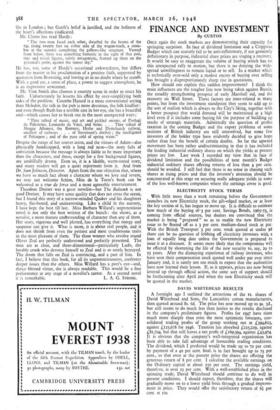FINANCE AND INVESTMENT
By CUSTOS
ONCE again the stock markets are demonstrating their capacity for springing surprises. In face of dividend limitation and a Crippsian Budget which can scarcely fail to be anti-inflationary, if not genuinely deflationary in purpose, industrial share prices are staging a recovery. It would be easy to exaggerate • the volume of buying which has set this unexpected rally in motion, but there is no denying the wide- spread unwillingness to remain liquid or to sell. In a market which is technically over-sold only a modest excess of buying over selling has brought a disproportionately sharp rise in quotations.
How should one explain this sudden improvement? I think the main influences are the tougher line now being taken against Russia, the steadily strengthening prospect of early Marshall aid, and the recovery on Wall Street. These factors are inter-related at many points, but from the investment standpoint they seem to add up to the sort of realism which is always to the City's liking, together with a better prospect that world demand will be maintained at a high level even if it includes some buying fodr the purpose of building up stocks of strategic materials. Admittedly the question of profits taxation in the coming Budget and the export problems of some sections of British industry are still unresolved, but some few investors of the bolder -type have evidently decided to give hope rather than fear the benefit of certain doubts. So far the upward movement has been rather undiscriminating in that it has included the leading industrial ordinary shares on which the yields at present prices are low. Last week I recorded my view that in face of dividend limitation and the possibilities of next month's Budget industrial ordinary shares offering returns of less than 4 per cent. should be avoided. I still feel that there is no sense in chasing such -shares at rising prices and that the investor's attention should be concentrated at this stage on securing really adequate yields in some of the less well-known companies where the earnings cover is good.
ELECTRICITY STOCK TERMS
With little more than a week remaining before the Government launches its new Electricity stock, the gilt-edged market, or at least the key section of it, has begun to move up. It is difficult to estimate how much of the buying of•3 per cent. Savings Bonds, 1965-75, is coming from official sources, but dealers are convinced that the market is being " prepared " so as to enable the new Electricity issue to be floated off as a 3 per cent, medium-dated stock at par. With the British Transport 3 per cent, stock quoted at under 98 there can be no question of fobbing off electricity investors with a loan of equally long date unless the Government is prepared to issue it at a discount. It seems more likely that the compromise will be effected by shortening the life of the new security to, say, 20 to 25 years. After the dismaying experience of railway investors, who have seen their compensation stock quoted well under par ever since January 2nd, it is surely not too much to expect that the authorities have now learned their lesson. If, as it appears, prices are now being levered up through official action the same sort of support should be forthcoming after April 2nd when the new Electricity stock will be quoted in the market.
DAVID WHITEHEAD RESULTS
A fortnight ago I outlined the attractions of the Is. shares of David Whitehead and Sons the Lancashire cotton manufacturers, then quoted around 8s. 6d. The price has now moved up to 9s. 3d., but still seems to do much less than justice to the results disclosed in the company's preliminary figures. Profits for 1947 have risen much more sharply than even the most optimistic forecasts, con- solidated trading profits of the group working out at £394,623, against £125,678 for 1946. Taxation has absorbed £225,229, against £81,704, but that still leaves a net profit of £169,394, against £43,974- It is obvious that the company's well-integrated organisation has been able to take full advantage of favourable trading conditions. The dividend, which I predicted would be made up to 70 per cent. by payment of a 40 per cent, final, is in fact brought up to 75 per cent., so that even at the present price the shares are offering the generous return of 8 per cent. I calculate the available earnings on the Ordinary capital at about 250 per cent. The earnings yield, therefore, is over 25 per cent. With a well-established place in the spinning trade, David Whitehead should continue to do well in present conditions. I should expect, therefore that the shares will gradually move on to a lower yield basis through a gradual improve- ment in price. They would offer the satisfactory return of 64- per cent. at 125


































 Previous page
Previous page